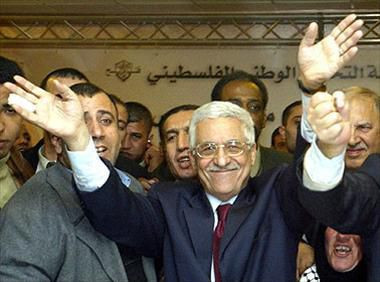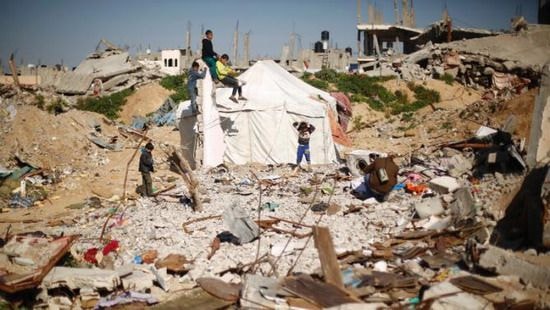President Abbas's effort to bring Israel to the international criminal court
(Baonghean) - On April 1, Palestine officially joined the International Criminal Court (ICC) after 3 months of Palestine joining the Rome Statute. This move is considered to pave the way for Palestinian legal measures against Israel under President Mahmoud Abbas after what the Jewish State caused in the 50-day war last year and Israeli Prime Minister Netanyahu's determination to build settlements in the Gaza Strip. However, achieving this goal is relatively difficult, not only that, it is likely to push the peace process between Israel and Palestine further into a deadlock...
President Mahmoud Abbas was born on March 26, 1935 in the ancient city of Safed, now Israel, his full name is Mahmoud Reda Abbas "Abu Mazen"; in 1948 he and his family had to take refuge during the Jewish state turmoil. At the age of 20, he joined the Palestinian group and was an important factor in the establishment of the Palestine Liberation Organization (PLO) in 1964. He distanced himself from terrorist activities, remaining in Syria when the PLO moved its military headquarters to Lebanon in the 1970s. He became one of the first PLO officials to lead negotiators to reach a peace agreement in 1990. He returned to Palestine in 1995 and became Secretary General of the PLO Executive Council in 1996. Regarding education, he graduated from Damascus University with a Bachelor of Laws degree in 1958; received his PhD from the Institute of Oriental Studies in Moscow in 1982 with the research topic “The Secret Relationship between Nazism and the Zionist Movement”.
 |
| Mr. Abbas celebrated his victory after the vote count results were announced. |
During the 2005 presidential campaign, Mahmoud Abbas made it clear that he would not back down from the Palestinians' principled demands: the return of refugees, the release of 7,000 prisoners in Israeli prisons, and the establishment of a Palestinian state in the West Bank and Gaza Strip, with East Jerusalem as its capital. With such strong campaign commitments, Mahmoud Abbas won the trust of voters (with 66.3% of the votes), far surpassing his main opponent, Mr. Moustapha Barghouti (only 19.7%). Immediately after the vote count results were announced, the people of Ramallah poured into the streets to celebrate Mr. Abbas's victory.
Voters' confidence in an independent state grew even stronger when many senior Israeli officials affirmed that with the election of Mahmoud Abbas as President, the Palestinian people had opened a new era of peace with issues that would be resolved through compromise and dialogue. Hours before the election ended, Israel announced that it would resume negotiations with the Palestinian government soon in case Abbas won. Speaking on national television, Israeli Foreign Minister Sylvan Shalom affirmed: "We (Israel) are ready to consider releasing some Palestinian prisoners and removing checkpoints in cities." Previously, Israeli Prime Minister Ariel Sharon at that time also said he was ready to meet the new Palestinian President to discuss plans to withdraw Israeli troops from the Gaza Strip and four locations in the West Bank.
 |
| The 50-day war in Gaza in the summer of 2014 left the area in ruins. |
However, since President Mahmoud Abbas came to power in 2005, despite diplomatic efforts and legal battles initiated by the Palestinians and supported by most of the international community, the prospect of peaceful coexistence in the Gaza Strip and an independent Palestinian state seems to be just a dream for the people of this Middle East region. Not only that, on July 8 last year, Israel launched a 50-day war called Operation Protective Edge. It is a military campaign conducted by the Israel Defense Forces in the Gaza Strip of Palestine. The cause of the campaign was that in the process of searching for three Israeli teenagers who were kidnapped and murdered in June 2014, the Israeli Army killed 10 Palestinians, injured 130 people and raided 500-600 related Hamas individuals.
In response, Hamas increased rocket attacks on Israel. According to official statistics from the Palestinian Authority, the 50-day war has killed more than 2,100 people and injured about 11,000, the victims are mainly civilians; more than 15,500 houses were destroyed, causing serious damage to the only power plant in the area and burning down dozens of factories. Rebuilding the ruins after the war is estimated to cost about 7.7 billion USD and nearly 10 years, but on the condition that Israel withdraws from the occupied territory and does not launch another war.
Since Mahmoud Abbas became president, the Gaza Strip has gone through three devastating wars and has been under Israeli siege since June 2007. This has resulted in a very low standard of living for Gazans, record high unemployment and a constant increase in poverty.
So, after joining the International Criminal Court, will President Mahmoud Abbas's efforts to bring individuals and organizations in Israel to court come true? This is clearly not an easy question to answer. Because according to political analysts, after officially becoming a member of the International Criminal Court, Palestine can carry out procedures in the hope of bringing Israeli leaders to trial before this institution. The Palestinian side will have to present the situation to the Court, informing the Court of crimes committed by Israel, for example in the most recent conflict in the Gaza Strip.
Next, the International Criminal Court's Prosecutor will decide whether to open an investigation. The procedures required for the court to prosecute Israeli leaders are lengthy and uncertain. However, the Palestinians, angry about the endless wars and decades of Israeli occupation, have decided to internationalize the issue. On the other hand, they have little hope of establishing a Palestinian state. And in fact, the International Criminal Court can prosecute Israel even though Israel has not joined the International Criminal Court. But that is only in theory because it is difficult to arrest Israeli suspects because the court has no law enforcement force of its own and depends on the cooperation of member states.
Thus, Palestine officially joined the ICC on April 1, in an effort by President Mahmoud Abbas to pave the way for the prosecution of Israel for war crimes in the context of the stalled Palestinian-Israeli peace process, which is predicted to be a thorny road ahead. The problem is that the internationalization of the dispute by Palestine, despite being supported by the international community, is facing fierce opposition from the Israeli government, so it is likely that in the coming time, tensions will escalate again in this never-peaceful area and the peace negotiation process for the Gaza Strip will become more difficult.
Southern Scenery
